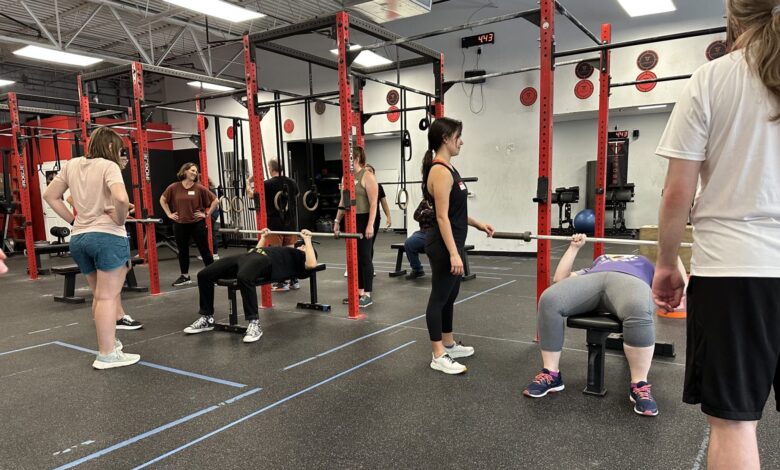Kids and adults with disabilities find community, fitness in workout class

By Isabel Lewis | North Carolina Health News
On a warm summer evening, laughter fills a gym furnished with red and black fitness equipment as more than 20 people attempt to grab clothespins attached to each other’s shirts.
This fitness class, called Power Hour, is a little different from some of the others offered throughout the Triangle region.
The clothespin exercise isn’t the only thing that distinguishes Power Hour at CrossFit Chapel Hill. Its inclusive approach, welcoming people of all ages and abilities, sets it apart too. Participants range from young teenagers to those who are starting to gray around the temples. Some have cognitive and physical disabilities and join in with the families and other members of the CrossFit community.
Power Hour is structured with a mix of warm-up games and exercises meant to show “that exercise can be fun,” said Kara Hume, one of the fitness instructors and a professor at the school of education at UNC-Chapel Hill. The class meets twice a month and is run by volunteers.
“This place changed my life,” said Hannah Spitzer, a Power Hour attendee.
Spitzer described herself as an adult with autism who has struggled with diabetes and self-esteem. She credits the positive interactions and emotional support she gets from the Power Hour program with motivating her to take control of her health and boost her self-esteem.
People go to Power Hour for different reasons. An adult who gave his name as Peter said he started attending because he wanted “to achieve some fitness goals.” Jonah Holloway, 29, didn’t have a specific goal for the program; he said his parents suggested he participate about a year ago.
The class always starts with introductions and ice-breakers. During one class in early June, participants were invited to say their names and tell others one thing they were excited about with summer on the horizon. The most popular answers were the end of school and beach trips.
After the introductions, there was a mix of games and activities that got the participants moving — and often laughing. There were relays, weight lifting, bench pressing, squats and more. The format of the class is consistent, but the warm-up games and specific workouts can change from week to week. As the class leaders introduced each activity, they made sure participants knew that all exercises could be modified. A physical therapist helps adapt any activity to an individual’s needs.
“It’s just fun,” Power Hour volunteer Duncan Murrell said after the session. He started volunteering slightly more than a year ago, he said, to “continue to build a community.”
That community building, creating an inclusive exercise environment, is one of the foundational goals of Power Hour.
That has taken time.
Power Hour started in the fall of 2018 out of CrossFit Chapel Hill after Haley Burhans, a pharmacy student at UNC Chapel Hill, brought inspiration from her gym in Alabama.
In Tuscaloosa, home of the University of Alabama, Burhans said there were not many physical and occupational therapy opportunities for kids in the area, so her gym stepped in to fill the void.
Burhans told NC Health News that she saw how successful the program had been in Alabama, forming “a solid community of kids that lived locally that had some form of disability.” She wanted to provide a similar resource in Chapel Hill.
Burhans was then a member of the CrossFit Chapel Hill gym and pitched the idea to the gym owners. It progressed from there. She recruited a handful of gym members to volunteer as coaches and started advertising the program.
The CrossFit gym seemed to be a good fit. Hayley Church, who helped Burhans develop Power Hour in Chapel Hill, told NC Health News that CrossFit is known for “prioritizing safety” through the use of “adaptive fitness.”
“What’s so cool about (CrossFit) is all the movements can be adapted based on individuals’ ability and what they need to focus on in terms of strength,” Church added.
Burhans moved away in 2019, and Church left after finishing her degree at Duke in December 2022. Although the two are elsewhere now, the program is still growing and going strong. At the Power Hour session in early June, one coach estimated that it might have drawn the largest group of athletes ever.
According to Hume, who started volunteering for Power Hour about four years ago, the program has had a core group of athletes throughout her time there — many of whom participated virtually during the height of the COVID-19 pandemic.
When Burhans started the program, she introduced it to the community by distributing fliers to local middle and high schools. Now, Hume said, most new participants learn about Power Hour from the participants themselves. The program is not advertised outside of the gym.
Hume, who teaches developmental and special education courses at UNC Chapel Hill, has plans to further expand Power Hour.
What’s next?
Hume said she wanted to participate in Power Hour because it brought together her passions: “building community, building connection and all-around physical activity.”
Power Hour did not have any financial backing when the program first started, and it has never charged anyone to participate in the program. Hume credits “super generous volunteers” and the CrossFit Chapel Hill gym itself with the program’s success. CrossFit Chapel Hill CARES, a separate nonprofit, has since offered the group everything from name tags to healthy snacks.
However, recently, Hume, along with Brianne Tomaszweski, a psychiatry professor at the UNC Chapel Hill School of Medicine, and Melissa Savage, a professor of educational psychology at the University of North Texas, applied for a grant from the National Institutes of Health.
They sought the assistance because of “an interest in expanding the inclusive exercise opportunities for those with intellectual disabilities, who have historically been left out of those spaces and opportunities.”
According to Hume, they received a $3.5 million grant to be used over five years. In 2023 alone, they will receive $753,000 from the National Institutes of Health.
With the grant, Hume hopes to encourage the formation of similar adaptive and inclusive exercise programs in gyms throughout the Triangle and, perhaps, beyond.
There also will be a site in Texas run by Savage, who led a research study in Chapel Hill with Hume called Step It Up. The study used fitness trackers to help assess the effectiveness of self-managed exercise programs for people with autism spectrum disorder and intellectual disabilities. They looked at whether intervention led to more steps and healthier lifestyles.
“Participants in the intervention group had significantly higher step counts and lost more weight,” according to a description of the study and its results, published on the Frank Porter Graham Child Development Institute website.
While Power Hour might be a 60-minute exercise course now, the grant will help those at the program’s core pursue more inclusive and widespread fitness activities with benefits that extend well beyond one single hour.
“The end goal is to positively influence the broader community in creating, building and involving individuals with intellectual disabilities [in] exercise settings,” Hume said.
North Carolina Health News is an independent, nonpartisan, not-for-profit, statewide news organization dedicated to covering all things health care in North Carolina. Visit NCHN at northcarolinahealthnews.org.
Keywords
Cumberland County,
health care,
disabilities,
fitness classes,
exercise course


